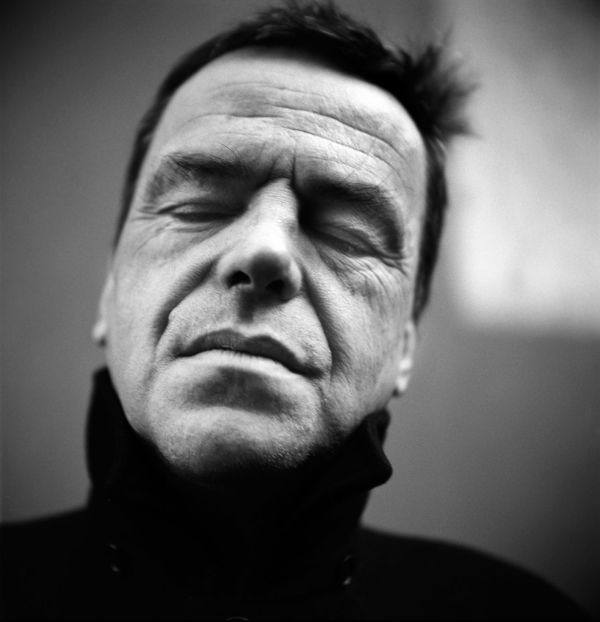![]() BY DAN TABOR FILM CRITIC Neil Jordan has been creating thought provoking cinema for decades and last week I got a few moments to chat with the director of such films as Interview With The Vampire, The Crying Game and The Company Of Wolves. His latest film, Greta, which opens today, is a captivating thriller about Frances, a young woman (Chloë Grace Moretz) in New York who befriends an older woman Greta (Isabelle Huppert) when she finds her purse on the subway. As Frances gets to know Greta, we soon find she is not exactly the harmless, little old woman she appears to be.
BY DAN TABOR FILM CRITIC Neil Jordan has been creating thought provoking cinema for decades and last week I got a few moments to chat with the director of such films as Interview With The Vampire, The Crying Game and The Company Of Wolves. His latest film, Greta, which opens today, is a captivating thriller about Frances, a young woman (Chloë Grace Moretz) in New York who befriends an older woman Greta (Isabelle Huppert) when she finds her purse on the subway. As Frances gets to know Greta, we soon find she is not exactly the harmless, little old woman she appears to be.
PHAWKER: So at the core of Greta, you take on love and loneliness and isolation and friendship, what inspired you to tackle these subjects in the guise of a horror film about a serial killer?
NEIL JORDAN: When I was sent the script, the fact that it was a woman, I found absolutely 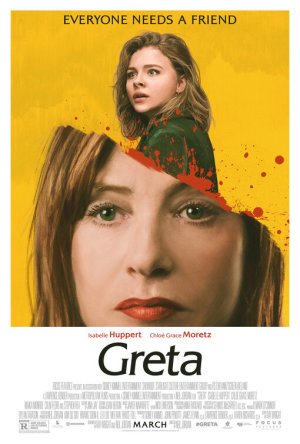 intriguing, you know, and it did two things: on the one hand it removed all that kind of sexual dynamic entirely. You know? And it made it about something else. And I thought it was much more interesting, the need for friendship, for a friend or, or a daughter figure or a mother figure. And I thought that was really smart, and I’d love to make a film like that. And that was really the one thing.
intriguing, you know, and it did two things: on the one hand it removed all that kind of sexual dynamic entirely. You know? And it made it about something else. And I thought it was much more interesting, the need for friendship, for a friend or, or a daughter figure or a mother figure. And I thought that was really smart, and I’d love to make a film like that. And that was really the one thing.
Once you do that and you begin to explore this issue of blighted motherhood, you know, it becomes much more compelling in a strange way. Do you understand what I mean? Also, if it’s a woman, the character of Greta, becomes almost terrifying real, you know? Like I don’t think you would ever meet or I would imagine you would meet Anthony Hopkins walking around Hannibal Lecter, unless you were happened to be in Haiti at the very end of that movie, or, invited to a dinner party with him. But you could meet Greta in that park outside, you can meet a little old lady feeding the birds, very well dressed, you know, high heels and just kind of well-done hair. You know, you could meet her in the Museum of Modern Art, you know? I thought, this could be a really great villain, you know, hiding in plain sight.
PHAWKER: That kind of segues into my next question, Isabelle Huppert, who plays Greta, is such an amazing presence in the film. She was spectacular in Elle. How did she come to be involved in the project? Because she is a bit of an unconventional but very effective choice for the antagonist.
NEIL JORDAN: I’ve been thinking of various people to play the role. A lot of people are scared of it, I won’t mention any names, but a lot of people were scared of it. I sent it to Isabelle and she responded to it and I met her and we’d began to talk about it. I basically decided to myself if she did this, I would restructured apart around her. The character in the original script was Hungarian, part of the immigration from Hungary to New York in the ’50s.
So, I said, okay Isabelle, I’m not going to make you French, I’m going to make pretend French. You have this French persona that you present to people, but the fact that you’re from some village in Hungary. Isabelle herself said her grandfather was in Hungary or something like that. So, she knew a little bit about the language in the culture. We basically built up this character that what we see is a façade and underneath that facade is another really terrifying layer.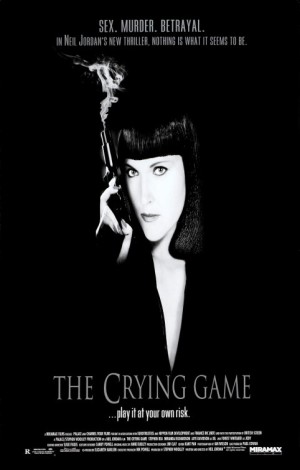
PHAWKER: Your co-writer Ray Wright is definitely more of a genre guy how did he come to be involved?
NEIL JORDAN: Yeah, it’s not so much that aesthetic. I was sent the script by a producer and I read it and then I spoke to him on the phone, and I said, okay. I began suggesting rewrites to him you know, ways of deepening the character. He was very amenable to those suggestions. Then when we came to make it as a movie, I kind of took over the writing task myself, because that’s the way I work. But I accepted it as a template. The story is his without a doubt.
PHAWKER: Now the film is very meticulously paced. You’re lulled into a false sense of security and a more grounded reality before things begin to get crazy. How much of that was in the script and how much of that was your rewrite?
NEIL JORDAN: I’ll tell you what I added. In his version there wasn’t the piano. There wasn’t that box. There wasn’t a private detective. There weren’t the layers to Greta, let’s put it that way. But everything else was there though. That’s what attracted me to the script: the naked kind drive of it, the simplicity of it. That’s what genre guys have really, you know, the simplicity of that bag and the hook, you know, the multiple bags. What he had that really attracted me to was the sequence where Greta is following Erica around with the phone.
PHAWKER: Yeah, that was a terrifying sequence.
NEIL JORDAN: That was Ray’s script. Also the double dream, you know, and I thought that was so clever. I really wanted to get my fingers into that and make it properly. So I accepted the story essentially. You know, and the elements that I added were all to do with the obsession of the nature of things and the characters.
PHAWKER: So, I want to ask about The Company of Wolves, because I am a big fan of that film as well and I think it shares a lot of similar DNA with Greta.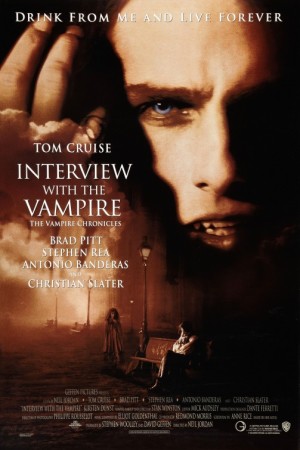
NEIL JORDAN: Yes. They’re both blighted fairy tales aren’t they?
PHAWKER: And you have this innocent character very much like Sarah Patterson’s character in Wolves. Little Red Riding Hood?
NEIL JORDAN: Yeah. Well, Company Of Wolves was based on an Angela Carter story and I wrote the script with Angela, who’s sadly dead now. But it was basically to show, the premise was that underneath, these fairy tales really are about dark psychosexual bloody things, you know? And Greta is a bit like the reverse. These, these dark psychosexual thrillers are really fairy tales. Do you understand that? So, it’s kind of a reverse thinking about it really.
PHAWKER: I think Greta works really well because it’s not salacious. There’s a purity to what Greta wants.
NEIL JORDAN: Oh, absolutely, she wants a child. She wanted a companion in the European sense, didn’t she? She wanted a friend and there’s something heartbreaking about that in a way, isn’t there?
PHAWKER: You even feel bad for Greta at points in the film. [WARNING: Spoiler Alert]
NEIL JORDAN: I hope so. I hope so. But you still want to stick her in that box, she belonged in that box. It’s European. It’s got like paintings of Hungarian peasants on the outside, you know? That’s where she’s home.
PHAWKER: Was that always the ending?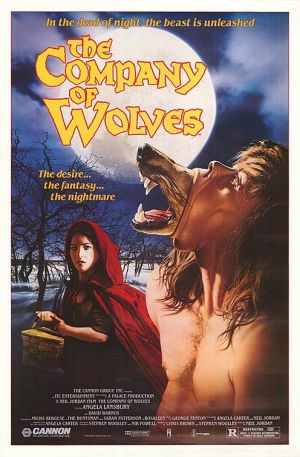
NEIL JORDAN: No, never. No. That was my ending. Well the original ending now, the original ending was her friend came around and rescued her in Ray’s original ending. They drugged her, but then she came back to life and she was chasing them around with the knife and all that sort of stuff. It went a bit crazy, you know, there was a big grotesque horror movie thing at the end and then, she was reunited with the father, cops came and all that sort of stuff, you know. I just didn’t want to do that. No, I just thought let’s put her in the box its far simpler, besides which I couldn’t afford the other ending. But the men were irrelevant to the story really. To try and make it, give him some relevance was to even stress how irrelevant they were.
PHAWKER: I agree, because it’s a very feminist story and its very much about these relationships between these women. Like Frances’ relationship with her roommate. Theses interactions felt very organic, did you do any kind of research into millennials for the dialog and dynamics?
NEIL JORDAN: You see that’s the thing, I really had to trust [Chloë Grace Moretz and Maika Monroe] because I don’t know that world. I don’t know how sassed-out young kids talk. Do you know what I mean? The talk about colonic irrigation and all that sort of stuff that — sorry. It’s, it’s just another generation. So I had a trust Chloe and Maika, on the dialogue that Ray had written, I just passed it back and forth. We played around with it quite a bit and they made it their own, so I hope that rings true. I had to trust the actors in that one.
PHAWKER: Chloe is becoming quite a presence in genre film these days, and she definitely puts a very interesting spin on Frances, why did you chose her for the role?
NEIL JORDAN: I liked her work.I sent it to her. You know, I knew her from Kick Ass. I liked at her in the remake she did of Let The Right One In. She was so good in that.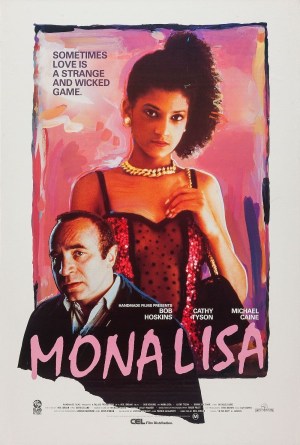 She was someone who could use her face and her eyes very quietly. She knows what silence is in a way and I really wanted an authentic American to play that role. You know, there’s a lot of Irish and British actors are playing American now. Like I could have cast someone like Saoirse Ronan. I just wanted a real American actually because there is a difference, you know? I think there is. You know what I mean? No matter how well Florence Pugh would play or how well Carey Mulligan could do New York or Mid-Western or whatever. They’re not American.
She was someone who could use her face and her eyes very quietly. She knows what silence is in a way and I really wanted an authentic American to play that role. You know, there’s a lot of Irish and British actors are playing American now. Like I could have cast someone like Saoirse Ronan. I just wanted a real American actually because there is a difference, you know? I think there is. You know what I mean? No matter how well Florence Pugh would play or how well Carey Mulligan could do New York or Mid-Western or whatever. They’re not American.
There is something about having somebody who really is American play this role, because I wanted it to be an encounter between the European and American. So the European has all this sophistication and guile and all this dark Grimms’ Fairy Tale history. You know, the American is all like kind of blonde hair and wheat fields.
PHAWKER: Very much like Little Red Riding Hood?
NEIL JORDAN: Yeah.
PHAWKER: Finally with you being an Oscar winner yourself with The Crying Game and all the drama this year with the Academy Awards, do you think they have evolved or devolved as an organization since your win?
NEIL JORDAN: I think you have to have sympathy for them because they’re trying to keep the habit alive really, you know, and they’re the only ones. I mean, I know the Oscars seems like an absurd institution of, you know, gray and blue hair, blue rinse ladies and ancient actors and actresses, but I like the fact that they believe in movies. If Roma does win best picture, I hope they immediately put it back in, put it into theaters, you know, because I think it’d be a terrible shame if, the night after the Oscars, the film that wins best picture is not there. I’m sure if Black Panther wins, they will put it in theaters immediately. I loved that movie by the way, Black Panther.

